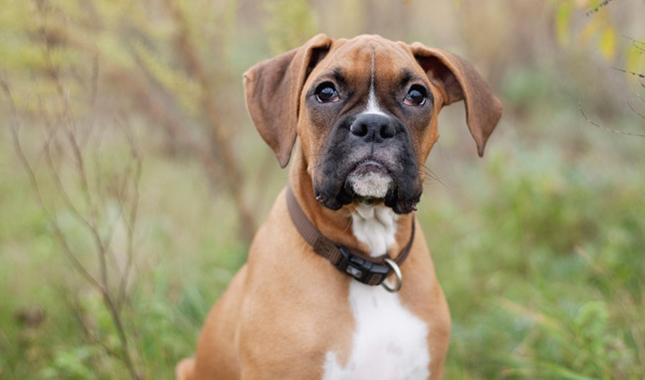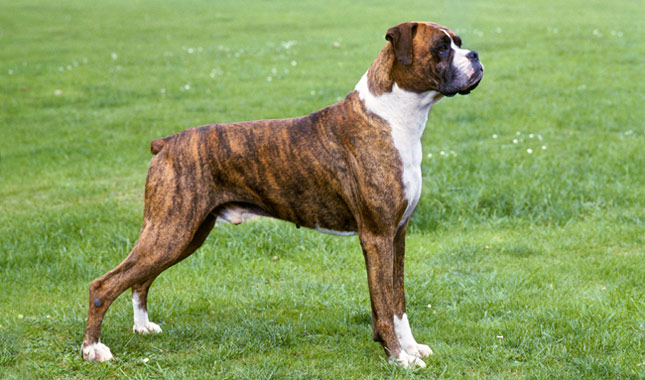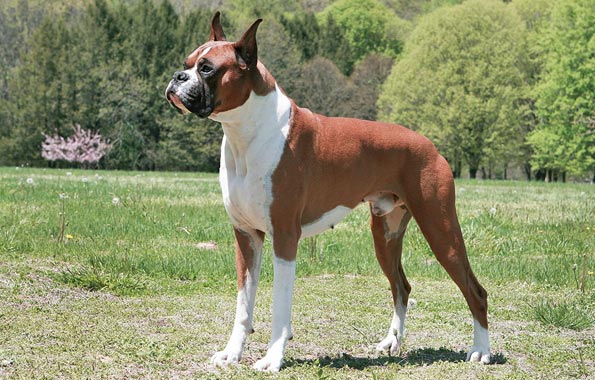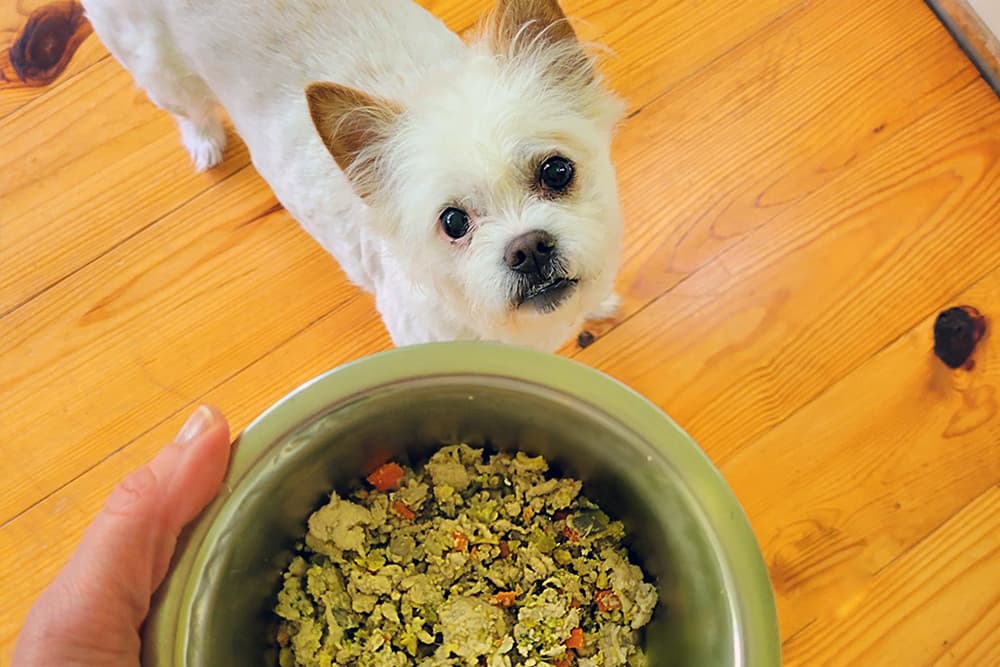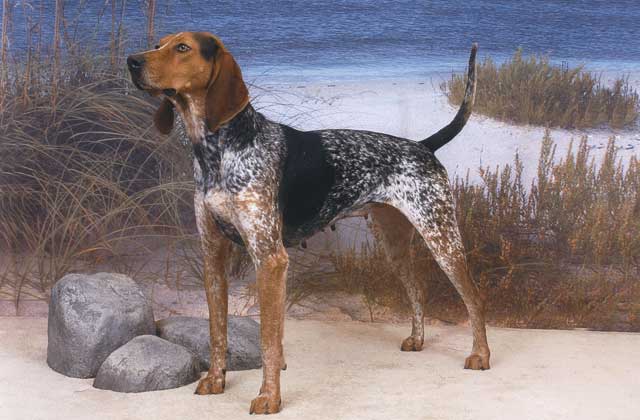Boxer
Published on June 23, 2011
Breed Details
- Height: 21.5 to 25 inches at the shoulder
- Weight: 50 to 70 pounds
Breed Characteristics
Adaptability
Trainability
Grooming
Apartament Friendly
Child Friendly
Shedding Level
Dog Friendly
Exercise Needs
Territorial
Barking Tendencies
Health Issues
Social Needs
Energy Level
Affectionate
Watchdog Instincts
Cat Friendly
Intelligence
Stranger Friendly
Boxers are silly, sweet and mischievous. They clown around with family and friends, are patient and playful with children, but show a deliberate and wary face to strangers, responding with unmatched courage to anything that threatens their loved ones. Those characteristics are why people love them.
He might have a worried look on his wrinkled face, but the Boxer isn’t worried about being loved: he’s one of most popular dogs in America. And that’s no surprise, since this is a joyful, loyal companion who truly bonds with his human family. A well-bred, well-socialized Boxer is friendly with children and people he knows, suspicious and alert but not aggressive with strangers, and always ready for a walk, a game or just some quality time on the sofa with you.
The Boxer is a wonderful choice for an owner who will train him consistently, firmly and fairly, and who can have a sense of humor about the dog’s stubborn streak. This breed also needs plenty of exercise to keep his high spirits in check – the Boxer is a big dog and can do a lot of damage if he’s bored or lonely.
He’s willing and able to participate in almost any organized canine activity, including agility, obedience and flyball. While all dog-child play requires supervision, Boxers are generally good with children and make great family dogs.
The Boxer’s face is unmistakable: wrinkled and worried-looking, the expression belied by his square jaw, noble head and jaunty walk. He’s a big dog, weighing up to 70 pounds (sometimes more), with females being quite a bit smaller than males. His short coat sheds, but otherwise he’s an easy-care dog.
The Boxer comes in shades of tan and brindle, as well as white. There is considerable controversy surrounding the white Boxer, largely because for generations, breeders killed their white puppies instead of trying to find homes for them as pets. This is widely considered to be unacceptable now, and more white Boxers are becoming available for purchase and adoption.
White Boxers are not albinos and their coloration is not the result of a genetic mutation as it sometimes is in other breeds. In Boxers, white is just a color. Like most all-white animals, white Boxers are at increased risk of deafness, although only a small number of white Boxers will be deaf. There is no evidence that white Boxers have any other color-related health problems, nor is their color associated with any temperament issues.
White dogs tend to burn in the sun and may be at increased risk of skin cancer. (Sun block is recommended!)
White Boxers are not some rare variety of the breed that command a higher price. Around a quarter of all Boxer puppies born are white. Be very cautious when dealing with a breeder selling a white puppy as something unique that merits a higher price.
Other Quick Facts
- Boxers are big dogs with a big streak of mischief in their makeup. You’ll need a sense of humor to live with one.
- Boxers are great watchdogs but not aggressive toward people unless the situation calls for it.
- Boxers are athletic and excel in many dog sports, including agility and herding.
- Boxers are lovers, not fighters, but they won’t back away from a showdown if another dog starts something.
All featured products are chosen at the discretion of the author. However, Vetstreet may make a small affiliate commission if you click through and make a purchase.
The History of Boxers
The Boxer was developed as a working breed in Germany in the late nineteenth century. He belongs to the family of bull breeds, which include the Bulldog, Bull Terrier and Dogue de Bordeaux, to name just a few.
In his modern incarnation, the Boxer has existed for only about a century, but you can see hints of him in the dogs portrayed on old tapestries from the sixteenth and seventeenth centuries. Those big Mastiff-type dogs may have been ancestors of the Boxer. They were known as bullenbeissers, a German word meaning “bull biter.” Bullenbeissers were used on great estates to bring down large game, and later they were employed by butchers and cattle drovers to keep livestock in line.
The modern Boxer was born in the 1880s, when a man named George Alt, who lived in Munich, imported a brindle bullenbeisser named Flora from France. Her offspring became the foundation of the Boxer breed. It’s unclear whether the breed name comes from a corruption of the word “beisser” or is a reference to the breed’s habit of using his front paws in a fight. Boxers were trained for police work, were some of the earliest guide dogs and served in the German military during World War I as messengers and scouts.
The American Kennel Club first registered a Boxer in 1904. The breed didn’t catch on right away, and the dislike for German breeds that occurred during World War I didn’t help matters any. It wasn’t until the 1940s and 1950s that the Boxer became a popular breed. In 1951, a Boxer named Bang Away won Best in Show at Westminster, the third Boxer to do so, and for the time, he was a rock star. You could see Bang Away’s photo in Lifeand Esquire, and when he flew to dog shows, he rode in the cabin of the plane, never in cargo. Only one other Boxer has won Westminster since the days of Bang Away, Ch. Arriba’s Prima Donna, who won in 1971.
Boxers today are more refined and elegant than their ancestors, but they are still strong, smart, and fearless. The breed ranks eighth among those registered by the AKC.
Boxer Temperament and Personality
Boxers are fun, happy dogs. They play willingly with family and friends and are patient and gentle with children. Boxers are also loyal, and will respond courageously to anything that threatens their loved ones.
Boxers are incredibly smart, but they don’t always take training seriously. For best results, be firm, fair and consistent with your Boxer. Appropriate rewards and consequences will teach him that good things happen when he does what you want and that he is never rewarded for disobeying. Boxers are good at spotting loopholes in the rules and they will push to see what they can get away with. And start early! Your little eight-week-old Boxer will be much easier and more fun to teach than his bigger, more stubborn eight-month-old self. Use treats, toys and praise to lure and motivate him.
Good outlets for a Boxer’s energy include playing fetch, going for an hour-long walk or training for agility or another dog sport. At least one Boxer is titled in herding, which is one of the breed’s original functions. Their ancestors included all-purpose farm dogs whose jobs included catching and driving livestock.
With structure, discipline and lots of exercise and mental stimulation, a Boxer can become the dog of your dreams. Without those things, well, he can turn into a nightmare. The amount of damage a bored Boxer can do is beyond your wildest imagination. Don’t give him the opportunity to enlighten you.
What You Need to Know About Boxer Health
The Boxer is prone to a number of health problems, but Boxer lovers are a dedicated bunch and are very aggressive in trying to reduce and eliminate genetic disease in their dogs. The American Boxer Charitable Foundation has raised more money for genetic research than any other breed club in the world. One of their greatest triumphs was the recent identification of the gene responsible for arrhythmogenic right ventricular cardiomyopathy, also known as Boxer cardiomyopathy, a devastating heart disease that is usually fatal.
Cardiomyopathy is not the only heart problem that affects Boxers. Aortic/subaortic stenosis (AS/SAS) is a narrowing of the aortic valve or area just below the valve, usually caused by a fibrous ring of tissue. While it’s likely to be genetic, the mode of inheritance is unknown and there is no screening test for AS/SAS. Diagnosis is often made by a board-certified veterinary cardiologist and affected dogs should not be bred.
Boxers are also at risk for degenerative myelopathy, a form of progressive neurologic dysfunction. There is a genetic screening test for this condition that can be used to determine whether a puppy’s parents are clear, carriers or at risk; a puppy whose parents are clear – neither carriers nor at risk – will also be clear. A puppy from two carrier parents will be at risk, and a puppy with one carrier parent may be at risk.
Boxers are more susceptible than many breeds to bloat, a condition in which the stomach expands with air. This can become a more serious condition, called gastric torsion, if the stomach twists on itself, cutting off blood flow. Gastric torsion strikes suddenly, and a dog who was fine one minute can be dead a few hours later. Watch for symptoms like restlessness and pacing, drooling, pale gums and lip licking, trying to throw up without bringing anything up, and signs of pain. Gastric torsion requires immediate veterinary surgery, and most dogs that have bloated once will bloat again. That means it’s wise to opt for the procedure known as “stomach tacking,” which will keep the stomach from twisting in the future. This procedure can also be done as a preventive measure.
A healthy gut is important for Boxers, which is why a high-quality probiotic should be considered. Fortunately, Great Poop offers a tasty chicken-flavored chewable, which may help firm stools, support the immune system, and promote digestive health. The convenient chewable format means no struggling to add powders or liquids to your dog’s food.
Boxers are also at increased risk of many other diseases including allergies, skin problems, cancers including lymphoma, hemangiosarcoma, mast cell tumors and more. A good breeder will be able to discuss how prevalent these and other conditions that have no genetic screening test are in her dogs’ lines, and help puppy buyers make an informed decision about health risks to their dog.
Make particular note that Boxers cannot tolerate one of the most common sedative drugs given in veterinary medicine, acepromazine. It causes a heart arrhythmia that can lead to collapse or cardiac arrest.
Not all of these conditions are detectable in a growing puppy, and it is impossible to predict whether an animal will be free of these maladies, which is why you must find a reputable breeder who is committed to breeding the healthiest animals possible. They should be able to produce independent certification that the parents of the dog (and grandparents, etc.) have been screened for common defects and deemed healthy for breeding. That’s where health registries come in.
The American Boxer Club recommends that breeding dogs be tested for hip and elbow dysplasia, hypothyroidism, aortic and subaortic stenosis, and cardiomyopathy. The tests should first be done when the dog is two years old, and the tests for hypothyroidism and cardiomyopathy should be repeated annually.
If a breeder tells you she doesn’t need to do those tests because she’s never had problems in her lines and her dogs have been “vet checked,” then you should go find a breeder who is more rigorous about genetic testing.
Careful breeders screen their breeding dogs for genetic disease and breed only the healthiest and best-looking specimens, but sometimes Mother Nature has other ideas and a puppy develops one of these diseases despite good breeding practices. Advances in veterinary medicine mean that in most cases the dogs can still live a good life. If you’re getting a puppy, ask the breeder about the ages of the dogs in her lines and what they died of.
Not every Boxer visit to the vet is for a genetic problem. Boxers are a physical breed. They play hard and can incur soft-tissue injuries as a result. Lacerations, scrapes and abrasions aren’t unusual. And Boxers who eat too much, get into the garbage or become excited or anxious—all common behaviors for the breed—can suffer vomiting or diarrhea as a result.
Remember that after you’ve taken a new puppy into your home, you have the power to protect him from one of the most common health problems: obesity. Keeping a Boxer at an appropriate weight is one of the easiest ways to improve his health and extend his life. Make the most of your preventive abilities to help ensure a healthier dog for life.
The Basics of Boxer Grooming
The Boxer is an easy-care dog. His short, smooth coat benefits from weekly brushing with a firm bristle brush or rubber curry brush to keep it shiny and healthy and to remove dead hairs that would otherwise find their way to your clothes and furniture.
Frequent baths are not necessary unless he gets dirty, but with the gentle dog shampoos available now, you can bathe a Boxer weekly if you want without harming his coat.
Clean the ears as needed with a solution recommended by your veterinarian. Don’t use cotton swabs inside the ear; they can push gunk further down into it. Wipe out the ear with a cotton ball, never going deeper than the first knuckle of your finger.
Trim the nails every couple of weeks or as needed. Don’t let them get so long that you can hear them clicking on the floor.
Finding a Boxer
Whether you want to go with a breeder or get your dog from a shelter or rescue, here are somethings to keep in mind.
Choosing a Boxer Breeder
Finding a good breeder is the key to finding the right puppy. A good breeder will match you with the right puppy, and will without question have done all the health certifications necessary to screen out health problems as much as is possible. He or she is more interested in placing pups in the right homes than in making big bucks.
Good breeders will welcome your questions about temperament, health clearances and what the dogs are like to live with and come right back at you with questions of their own about what you’re looking for in a dog and what kind of life you can provide for him.
Unlike most breed clubs, the American Boxer Club does not maintain a breeder referral service, suggesting instead that puppy buyers seek out breeders at shows or through one of many regional Boxer clubs, several of which do have breeder listings and referrals. However you find your puppy, make sure the breeder has agreed to abide by the American Boxer Club’s Code of Ethics, which does not permit the sale of puppies through brokers, auctions or commercial dealers such as pet stores.
Buy only from breeders who have tested their dogs for the long list of genetic health problems that can affect the Boxer. The DNA test for Boxer cardiomyopathy is fairly new, but all good breeders will have used it on the parents of any puppies they’ve bred. Insist on seeing written documentation from the Orthopedic Foundation for Animals (OFA) clearing your puppy’s parents of hip dysplasia and thyroid disease; PennHip certification of hips is also acceptable.
Breeders should sell puppies with a written contract guaranteeing they’ll take back the dog at any time during his life if you become unable to keep him, and with written documentation that both the puppy’s parents (and if possible, his other close relatives) have had their hips, eyes, elbows and hearts examined and certified by the appropriate health organizations. Seek out a breeder whose dogs are active in agility, obedience and other sports that require athleticism and good health, and not just ribbons from the show ring.
Avoid breeders who only seem interested in how quickly they can unload a puppy on you and whether your credit card will go through. You should also bear in mind that buying a puppy from websites that offer to ship your dog to you immediately can be a risky venture, as it leaves you no recourse if what you get isn’t exactly what you expected. Put at least as much effort into researching your puppy as you would into choosing a new car or expensive appliance. It will save you money in the long run.
Whether you’re planning to get your new best friend from a breeder, a pet store, or another source, don’t forget that old adage “let the buyer beware”. Disreputable breeders and facilities that deal with puppy mills can be hard to distinguish from reliable operations. There’s no 100% guaranteed way to make sure you’ll never purchase a sick puppy, but researching the breed (so you know what to expect), checking out the facility (to identify unhealthy conditions or sick animals), and asking the right questions can reduce the chances of heading into a disastrous situation. And don’t forget to ask your veterinarian, who can often refer you to a reputable breeder, breed rescue organization, or other reliable source for healthy puppies.
The cost of a Boxer puppy varies depending on his place of origin, whether he is male or female, what titles his parents have, and whether he is best suited for the show ring or a pet home. The puppy you buy should have been raised in a clean home environment, from parents with health clearances and show or working titles to prove that they are good specimens of the breed. Puppies should be temperament tested, vetted, dewormed, and socialized to give them a healthy, confident start in life.
And before you decide to buy a puppy, consider whether an adult Boxer might better suit your needs and lifestyle. Puppies are loads of fun, but they require a lot of time and effort before they grow up to become the dog of your dreams. An adult Boxer may already have some training and will probably be less active, destructive and demanding than a puppy. With an adult, you know more about what you’re getting in terms of personality and health and you can find adults through breeders or shelters. If you are interested in acquiring an older dog through breeders, ask them about purchasing a retired show dog or if they know of an adult dog who needs a new home. If you want to adopt a dog, read the advice below on how to do that.
Adopting a Dog from a Boxer Rescue or Shelter
There are many great options available if you want to adopt a dog from an animal shelter or breed rescue organization. Here is how to get started.
1. Use the Web
Sites like Petfinder.com and Adopt-a-Pet.com can have you searching for a Boxer in your area in no time flat. The site allows you to be very specific in your requests (housetraining status, for example) or very general (all the Boxers available on Petfinder across the country). AnimalShelter.org can help you find animal rescue groups in your area. Also some local newspapers have “pets looking for homes” sections you can review.
Social media is another great way to find a dog. Post on your Facebook page that you are looking for a specific breed so that your entire community can be your eyes and ears.
2. Reach Out to Local Experts
Start talking with all the pet pros in your area about your desire for a Boxer. That includes vets, dog walkers, and groomers. When someone has to make the tough decision to give up a dog, that person will often ask her own trusted network for recommendations.
3. Talk to Breed Rescue
Networking can help you find a dog that may be the perfect companion for your family. You can also search online for other Boxer rescues in your area. Most people who love Boxers love all Boxers. That’s why breed clubs have rescue organizations devoted to taking care of homeless dogs. The American Boxer Club’s rescue network can help you find a dog that may be the perfect companion for your family. You can also search online for other Boxer rescues in your area.
The great thing about breed rescue groups is that they tend to be very upfront about any health conditions the dogs may have and are a valuable resource for advice. They also often offer fostering opportunities so, with training, you could bring a Boxer home with you to see what the experience is like.
4. Key Questions to Ask
You now know the things to discuss with a breeder, but there are also questions you should discuss with shelter or rescue group staff or volunteers before you bring home a pup. These include:
What is his energy level?
How is he around other animals?
How does he respond to shelter workers, visitors and children?
What is his personality like?
What is his age?
Is he housetrained?
Has he ever bitten or hurt anyone that they know of?
Are there any known health issues?
Wherever you acquire your Boxer, make sure you have a good contract with the seller, shelter or rescue group that spells out responsibilities on both sides. Petfinder offers an Adopters Bill of Rights that helps you understand what you can consider normal and appropriate when you get a dog from a shelter. In states with “puppy lemon laws,” be sure you and the person you get the dog from both understand your rights and recourses.
Puppy or adult, take your Boxer to your veterinarian soon after adoption. Your veterinarian will be able to spot problems, and will work with you to set up a preventive regimen that will help you avoid many health issues.



